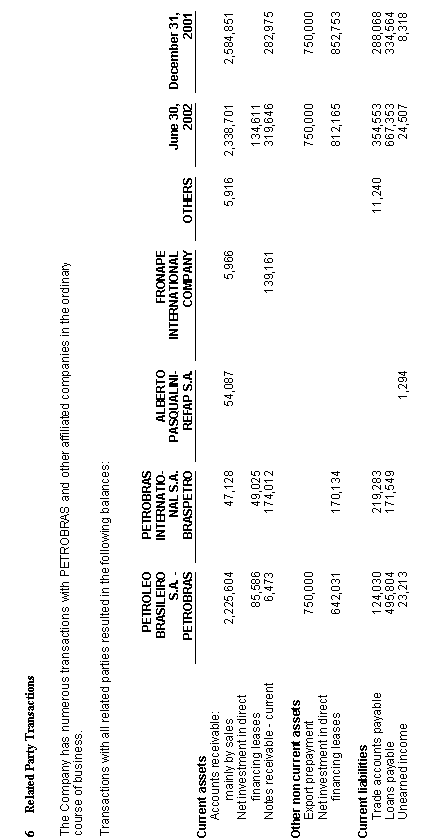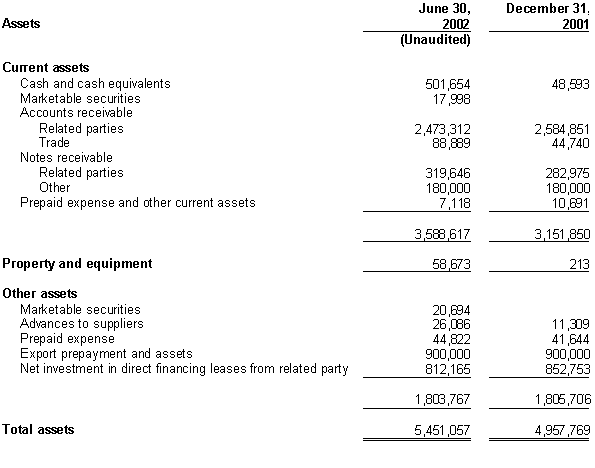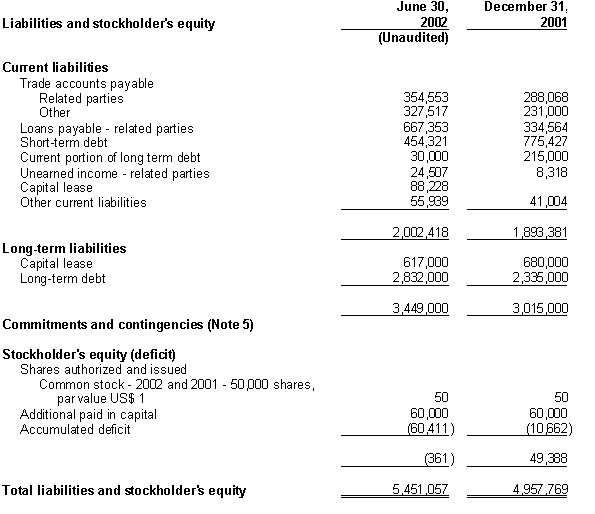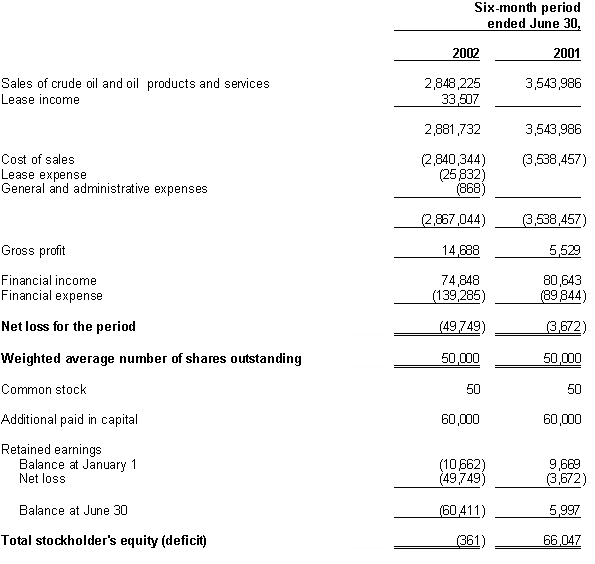The Company entered into various commitments for the purchase of production equipment totaling US$ 265,651. The equipment purchased will become part of a Master Lease Agreement, which has not yet been executed.
In an effort to ensure procurement of oil products for the Company’s customers, the Company currently has several contracts which collectively obligate it to purchase a minimum of approximately 211,455 barrels of oil and oil products per day at market prices.

The principal amounts of business and financial operations carried out with related parties are as follows:
 * * *
* * *MANAGEMENT’S DISCUSSION AND ANALYSIS
OF FINANCIAL CONDITION AND RESULTS OF OPERATIONS FOR THE SIX-
MONTH PERIOD ENDED JUNE 30, 2002
Forward Looking StatementsThis report on Form 6-K contains "forward-looking statements" within the meaning of Section 27A of the Securities Act of 1933, as amended, and Section 21E of the Securities Exchange Act of 1934, as amended, that are not based on historical facts and are not assurances of future results. These forward-looking statements are subject to certain risks and uncertainties, including, but not limited to, our ability to obtain financing, changes in the use of our services for market purchases of crude oil and oil products by Petroleo Brasileiro S.A. - Petrobras and changes in government regulations.
All forward-looking statements attributed to us or a person acting on our behalf are expressly qualified in their entirety by this cautionary statement, and you should not place reliance on any forward-looking statement contained herein.
Basis of PresentationYou should read the following discussion of our financial condition and results of operations together with the attached unaudited consolidated financial statements and the accompanying notes as of and for the six-month period ended June 30, 2002 beginning on page F-2. You should also read our audited consolidated financial statements for the year ended December 31, 2001 and the accompanying notes, which are included in our annual report on Form 20-F, but which are not presented herein. The unaudited consolidated financial statements as of and for the six-month period ended June 30, 2002 and the accompanying notes have been presented in U.S. dollars and prepared in accordance with accounting principles generally accepted in the United States ("U.S. GAAP"). Although Cayman Islands law does not require that we prepare and file financial statements, we do so in accordance with U.S. GAAP. In addition, as a subsidiary of Petrobras, we also prepare our financial statements in accordance with Brazilian Corporate Law.
OverviewWe are a wholly-owned subsidiary of Petrobras. Accordingly, our financial position and results of operations are largely affected by decisions of our parent company. Our ability to meet our obligations in respect of our outstanding indebtedness depends on a number of factors, including:
- the extent to which Petrobras continues to use our services for market purchases of crude oil and oil products;
- Petrobras' willingness to continue to make inter-company loans and provide us with other financial support;
- our ability to access financing sources, including third-party credit facilities; and
- our ability to transfer our financing costs to Petrobras.
We earn income from:
- sales of crude oil and oil products to Petrobras;
- limited sales of crude oil and oil products to third parties;
- financial income derived from financing of sales to Petrobras and inter-company loans to Petrobras, investments in marketable securities and other financial instruments; and
- leasing income derived from financing leases entered into with Petrobras.
Our operating expenses include:
- cost of sales, which is comprised mainly of purchases of crude oil and oil products;
- financial expense, mainly from interest on our lines of credit and capital markets indebtedness and inter-company loans from Petrobras; and
- leasing expenses derived from financing leases entered into with third parties and Petrobras.
Purchases and Sales of Crude Oil and Oil ProductsWe typically purchase crude oil and oil products in transactions with payment terms of approximately 30 days. Petrobras typically pays for shipments of crude oil and oil products that we sell to it over a period ranging between 120 and 270 days, which allows Petrobras sufficient time to assemble the necessary documentation under Brazilian law to commence the payment process for its shipments. During this period, we typically finance the purchase of crude oil and oil products through either funds previously provided by Petrobras or third-party trade finance arrangements. Sales to Petrobras are calculated according to a formula based on LIBOR designed to reimburse us for estimated financing expenses we may incur in connection with these sales. The difference between the amount we pay for crude oil and oil products and the amount Petrobras pays for that same crude oil and oil products is deferred and recognized as part of our financial income on a straight-line basis over the period in which Petrobras' payments to us come due. We are continuing to work with Petrobras to establish an alternative reimbursement formula to fully reimburse us for our financing expenses.
TaxesThe Cayman Islands currently impose no income, corporation or capital gains tax and no estate duty, inheritance tax or gift tax. The only government charge payable by us in the Cayman Islands is an annual registration fee of U.S.$500 calculated on the basis of the nominal amount of our authorized share capital. A stamp duty would also be payable on any documents that are executed or brought into the Cayman Islands.
Results of operations for the six-month period ended June 30, 2002 (the "First Half of 2002") compared to the six-month period ended June 30, 2001 (the "First Half of 2001")
Sales
Our sales of crude oil and oil products and services (including sales of imports of crude oil and oil products and sales of services) decreased 19.6% from U.S.$3,544 million in the First Half of 2001 to U.S.$2,848 million in the First Half of 2002, primarily due to a decrease in the average price of Brent crude oil from U.S.$26.59 per barrel in the First Half of 2001 to U.S.$23.09 per barrel in the First Half of 2002 and to a reduction of 24%in the volume of crude oil and oil products imported by Petrobras from 138.752 million of barrels in the first half of 2001 to 104.850 barrels in the first half of 2002, resulting from an increase in Petrobras' production of crude oil and oil products in Brazil.
Lease IncomeOur lease income reflects income from direct financing leases of platforms, equipment and vessels and consists of interest income derived by us and our subsidiaries from such leases. For the First Half of 2002, our lease income was U.S.$33.5 million. Prior to the First Half of 2002, we had no income from direct financing leases.
Cost of SalesCost of sales decreased 19.7% from U.S.$3,538 million in the First Half of 2001 to U.S.$2,840 million in the First Half of 2002, due primarily to the reduction in the volume of crude oil and oil products imported by Petrobras resulting from an increase in Petrobras' production of crude oil and oil products in Brazil, as well as a decrease in the average price of Brent crude oil.
Lease ExpenseOur lease expense reflects expenses from direct financing leases of platforms, equipment and vessels and consists of interest expenses derived from such leases. In the First Half of 2002, our lease expense was U.S.$25.8 million. Prior to the First Half of 2002, we had no expense related to direct financing leases.
General and Administrative ExpensesOur general and administrative expenses are primarily attributable to fees paid for financial consulting and accounting services. In the First Half of 2002, our general and administrative expenses were U.S.$0.9 million. In the First Half of 2001, we had no general and administrative expenses.
Gross ProfitOur gross profit reflects profits earned by us from our third-party sales of crude oil and oil products and services (since we record profits from sales of crude oil and oil products to Petrobras as financial income) and from our leasing transactions. Gross profit increased from U.S.$5.5 million in the First Half of 2001 to U.S.$14.7 million in the First Half of 2002, due primarily to U.S.$7.7 million in profits generated by the initiation of a leasing transaction for platforms, equipment and vessels with Petrobras.
Financial IncomeOur financial income decreased 7.2% from U.S.$80.6 million in the First Half of 2001 to U.S.$74.8 million in the First Half of 2002, primarily due to the reduction of LIBOR rates used in the formula designed to reimburse us for financing expenses incurred.
Financial ExpenseFinancial expense increased 55.1% from U.S.$89.8 million in the First Half of 2001 to U.S.$139.3 million in the First Half of 2002, primarily due to the significant change in our maturity profile, resulting from contracting long-term obligations to replace a portion of our short-term debt obligations.
Net LossNet loss increased from a loss of U.S.$3.7 million in the First Half of 2001 to a loss of U.S.$49.7 million in the First Half of 2002.
Liquidity and Capital ResourcesWe finance our oil trading activities through a combination of inter-company loans from Petrobras, commercial paper programs, lines of credit and the issuance of notes in the international capital markets. In our opinion, our working capital is sufficient for our present requirements.
Our short-term borrowings are denominated in U.S. dollars and consist of commercial papers and lines of credit. During the First Half of 2002, we did not issue any commercial paper notes, but as of June 30, 2002, we accessed U.S.$484.3 million in lines of credit, including the current portion of long-term debt, compared to U.S.$449.8 million in commercial paper notes and US$540.7 million in lines of credit as compared to December 31, 2001. The weighted average annual interest rate on these short-term borrowings was 4.2% at June 30, 2002, compared to 2.8% at December 31, 2001.
At December 31, 2001, we had a U.S.$500 million commercial paper program in place, which we renewed in April 2002 in a lesser amount of U.S.$335 million in order to provide us financing flexibility for our daily operations. Our commercial paper program is rated A1+ by Standard & Poor's and P-1 by Moody's and is supported by a letter of credit issued by Barclays Bank and a standby purchase agreement with Petrobras. As of June 30, 2002, we also had access to short-term capital through U.S.$314 million in irrevocable letters of credit supporting oil imports.
As of June 30, 2002, we had outstanding U.S.$382 million in long-term lines of credit due between 2003 and 2012 and U.S.$1,550 million in three series of long-term notes due between 2007 and 2011.
Pursuant to Petrobras' strategy to obtain a wider range of medium- and long-term financial instruments and to channel more of its financings through us, in the beginning of 2002, we issued a series of U.S.$500 million notes, using the net proceeds to liquidate our short-term debt. As of June 30, 2002, we had a capital deficit of U.S.$0.4 million, including initial and additional paid-in-capital of U.S.$60.0 million, as well as an accumulated deficit of U.S.$60.4 million.
As part of Petrobras' strategy to increase our capitalization and improve its offshore liquidity position, Petrobras increased its loans to us. As a result, our notes payable to Petrobras increased from U.S.$335 million at December 31, 2001 to U.S.$667 million at June 30, 2002. As a result of Petrobras' cash advances to us, our cash and cash equivalents increased from U.S.$48.8 million in the First Half of 2001 to U.S.$501.7 million in the First Half of 2002.
As an offshore non-Brazilian company, we are not legally obligated to receive prior approval from the Brazilian National Treasury to incur debt or register debt with the Central Bank. However, as a matter of policy, the issuance of any debt is recommended by Petrobras' board of directors and subsequently approved by our board.
We have the following capital markets debt outstanding as of June 30, 2002:CAPITAL MARKETS DEBT OUTSTANDING
As long as any 9 1/8%, 9 3/4% or 9 7/8% notes are outstanding, we will not create or permit any lien, other than a "PIFCo Permitted Lien" as defined in the prospectus of each issuance, on any of our assets in order to secure additional indebtedness, except under certain conditions.
The following table sets forth the sources and amounts of current and long-term debt as of June 30, 2002 and December 31, 2001:
CURRENT AND LONG-TERM DEBT










